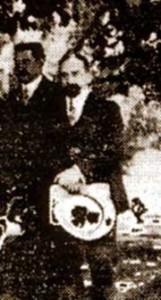Robert Rengifo
Eissmann, Rafael Videla
Rafael Videla Eissmann is a Chilean historian and lecturer(a). He has published two books (in Spanish) on Atlantis[799][800] based on conversations with the Chilean nazi Miguel Serrano. The theories of Hanns Hörbiger are investigated and supported. Eissmann has also lectured on Hörbiger and other heroes and supporters of the Third Reich such as Edmund Kiss.
Hanns Hörbiger are investigated and supported. Eissmann has also lectured on Hörbiger and other heroes and supporters of the Third Reich such as Edmund Kiss.
Eissmann’s most important contribution to Atlantean studies was arguably his resurrection[792] of the work of Robert Rengifo(c)* who along with Arthur Posnansky were possibly the first people to suggest Antarctica as the location of Atlantis.
In 2021, Eissmann published a Bibliography in Spanish of the Works of James Churchward.(b)
(a) https://www.obrasrafaelvidelaeissmann.blogspot.com/
Rengifo, Robert
Robert Rengifo was a little known Chilean professor who flourished in the early decades of the 20th century. He had an intense interest in the prehistory of America and presented  his views in the Proceedings of the prestigious Societe Scientifique du Chili(The Scientific Society of Chile) from 1904 until 1935. He focused on the aboriginal peoples of Chile and in particular Patagonia in the extreme south. His attention was drawn even further south to Antarctica where he controversially concluded that man had originated (rather than Africa). Then following a catastrophic axial pole shift that destroyed Atlantis, which was located in Antarctica, people were forced to migrate, populating the rest of the Americas and then the world.
his views in the Proceedings of the prestigious Societe Scientifique du Chili(The Scientific Society of Chile) from 1904 until 1935. He focused on the aboriginal peoples of Chile and in particular Patagonia in the extreme south. His attention was drawn even further south to Antarctica where he controversially concluded that man had originated (rather than Africa). Then following a catastrophic axial pole shift that destroyed Atlantis, which was located in Antarctica, people were forced to migrate, populating the rest of the Americas and then the world.
Rafael Videla Eissmann, who has championed Rengifo’s work has drawn attention to an excerpt from the epic poem, La Araucana, by Alonso de Ercilla y Zúñiga (1533-1594) which translates from the original Castilian as
“Chile, fertile and known land
in the famous Antarctic region
from ancient nations respected
because of being strong, important and powerful”.
Eissmann believes that this suggests knowledge of an ancient Antarctic polar civilisation!
While many of his conclusions may now appear purely speculative, in fact, Rengifo thought his views would eventually be vindicated by archaeology. The Monte Verde site in southern Chile has since been dated to around 11,000 BC. In addition, the enormous dressed stone blocks of El Enladrillado, also in Chile, raise questions about the technological capabilities of the region’s early inhabitants.
This apparent movement of peoples from south to north was endorsed by Arthur Posnansky in his 1919 book La Hora Futura [0941] The ensuing half century saw more of his conclusions echoed by researchers such as Charles Hapgood, the Flem-Aths, Hugh Auchincloss Brown and Robert Argod.
His work has recently been highlighted in a 2008 book[792] by Rafael Videla Eissmann as well as in a series of papers on his website(a). Another overview of Rengifo’s theories is available online(b).
(a) https://obrasrafaelvidelaeissmann.blogspot.com/ (Spanish) [use search facility]
*(b) https://web.archive.org/web/20160326042154/https://www.alertaaustral.cl/articulo.php?id=190*
